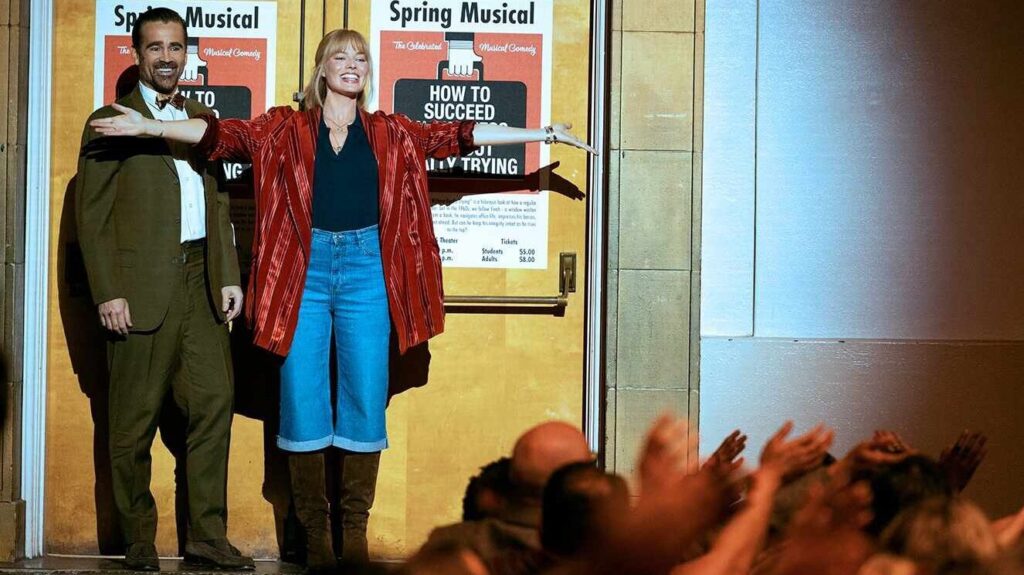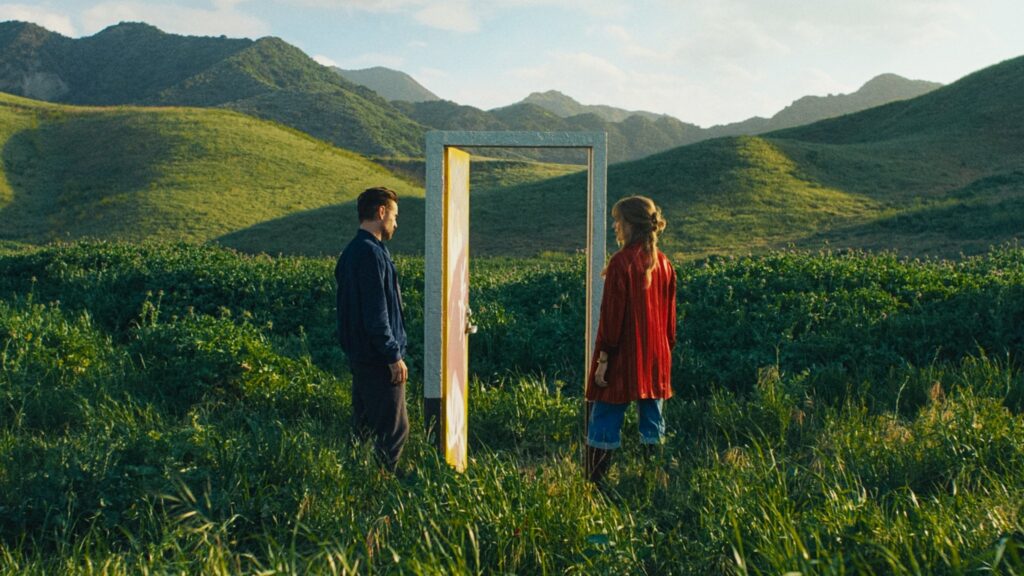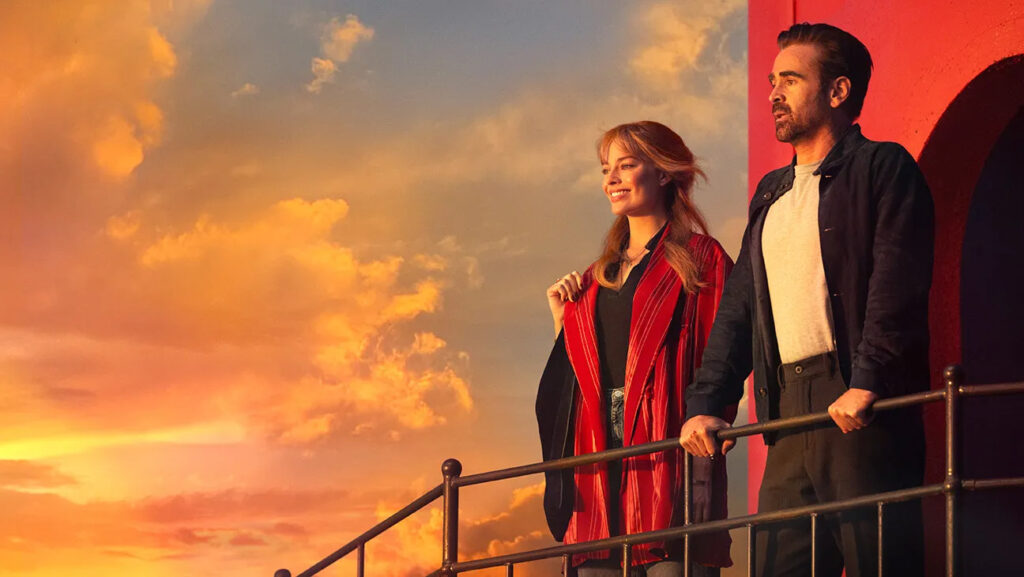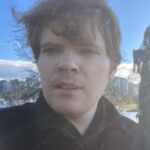Early in Kogonada’s “A Big Bold Beautiful Journey,” David (Colin Farrell) is teleported back to his old high school’s production of “How to Succeed in Business Without Really Trying”—and the moment when his romantic delusions were pulverized by his crush and co-star, Cheryl (Chloe East).
Unlike Rosemary Pilkington in the play, Cheryl does not appear eager to keep anyone’s dinner warm (and tells David as much onstage). Yet rather than sidestep his youthful agony, David sticks close to the script of recorded history, dutifully reliving Cheryl’s rejection.
“Sometimes, you have to perform to get to the truth,” he insists. An actor both onstage and off, he will inhabit as many characters as it takes to rouse his flagging spirits—even, it turns out, the character of a lovelorn seeker spurred on a romantic quest by a mystical GPS device.
“Should we be trusting the GPS?” wonders Sarah (Margot Robbie), who joins David’s surreal sojourn. “I have nothing to lose,” David replies. Neither, apparently, does Kogonada, who tears into Seth Reiss’ conceptually audacious screenplay as if it’s the last script he’ll ever direct (I hope it isn’t).
Originally a video essayist, Kogonada began his ascension to auteur status when he wrote and directed “Columbus” (2017), an ethereal drama about two stricken souls (John Cho and Haley Lu Richardson) adrift amid the modernist marvels of Columbus, Indiana.
“How can you be modern in this world with some kind of meaningfulness?” Kogonda once mused, ruminating on “Columbus.” It’s a question he addresses in “Journey” by placing David and Sarah’s happiness in the hands of a higher power—what believers call God, skeptics call fate, and screenwriters call a MacGuffin.
While Keanu Reeves and Sandra Bullock made do with a mailbox in “The Lake House” (2006), David’s chronologically scrambled meet cute demands something with (somewhat) more horsepower: a rented 1994 Saturn SL outfitted with the aforementioned GPS, embodied vocally by Jodie Turner-Smith (who starred opposite Farrell in Kogonada’s futuristic 2021 drama “After Yang”).

“David, do you want to go on a big, bold, beautiful journey?” Turner-Smith’s authoritative, melodious voice inquires. As if propelled backward by David’s enthusiastic response, Kogonada films him answering from outside the car, with teardrops of rain pelting against the windshield.
Ordered to dine at Burger King (the GPS has little compassion for the protagonist’s cholesterol), David reunites with Sarah, whom he introduced himself to at a friend’s wedding as “David from the north side” (she lives downtown in the nameless city where they both reside).
At the wedding, David and Sarah’s strained flirtation barely survived the “Do you want a drink?” “No, I’m good” stage of conversation. Yet now, with Sarah’s car mysteriously and fatefully sputtering, they find themselves on a magical-realist road trip, marked by doors that turn out to be portals to the past.
“Doors can be tricky,” warns a matchmaking cashier (Phoebe Waller-Bridge). Try traumatizing: All it takes is a turn of the knob for David and Sarah to be submerged in the riptide of a humiliation, breakup, or death, with each flashback amplifying their fear of and hunger for forced intimacy.
“I think if I let him in, he will always be here,” says Sarah of David. Belying David’s belief that the GPS is a component of a “soulmate service,” the film intimates anyone on this trip would begin to experience what Owen Wilson’s character in “Wedding Crashers” (2005) described (not entirely insincerely) as “your soul’s recognition of its counterpoint in another.”
Marrying a fantastical, open-hearted premise with a paean to the grimy work of getting to know a potential significant other, “Journey” both burnishes and diminishes David’s childhood dream of his future: sporting a groom’s top hat and fathering three children.
“I don’t want to upset you,” David says sincerely when Sarah sputters after he professes his adoration for her. A proudly mushy man, David swiftly discovers what limits his romanticism: his tendency to yearn so deeply that he’s flummoxed when his desires are fulfilled.

While David’s evolution illuminates the contradictions of the post-toxic masculinity era, Sarah’s experiences betray Kogonda’s narrow understanding of femininity—and his hesitance to risk unleashing Robbie’s explosive charisma.
“You have destroyed some men,” David tells Sarah with amusement. On the contrary, I would argue that she was destroyed by Kogonada and Reiss, whose clichéd concept of a “strong female character” is a woman with a history of infidelity and a dead mother.
With a less restrained director, Robbie might have eclipsed the script’s banalities with the sheer chutzpah she exuded as Nellie LaRoy, the jubilantly vulgar antiheroine of Damien Chazelle’s cinematic bacchanal “Babylon” (2022).
“This is what a degenerate fucking animal from Jersey does!” Nellie roars in a gloriously grotesque scene, devouring a banquet that leaves her cheeks stained with crimson goop. Spotlighting Robbie at her voracious best, that moment solidified the impression that she thrives on kinetic extroversion, not the expressive introversion that a sensitive director like Kogonada solicits.
Unlike David and Sarah, for whom a cathartic conclusion is foreordained, Kogonada could go anywhere from here. He could return to the hushed realism of “Columbus”; revisit the sci-fi serenity of “After Yang”; or perfect the anguished wish fulfillment of “Journey.”
“The conversation of cinema for me, beyond the technical and historical aspects, is a conversation of time, existence, and humanity,” Kogonada has said previously. It’s a testament to his talents that even a film as flawed as “Journey” contributes fluently to that conversation.
Given the critical and audience indifference to “A Big Bold Beautiful Journey,” I don’t expect Kogonada to double down on dreamy romances. That’s why I intend to treasure the movie’s passages of poetic closeness, like David and Sarah (inexplicably, beautifully) kissing while perched in orbit above Earth.
“I prefer being nervous with you than feeling nothing all by myself,” David ultimately confesses. Within those words lies the reason why we need films like this, imperfect or not, on the big screen: They afford us the ecstatic joy of being nervous—about cinema, compassion, connection—together.



